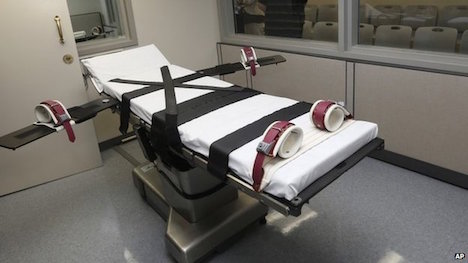|

|
|
By Staff Writers, BBC
BBC Newsworld
Thursday, Jan 29, 2015
The US Supreme Court has postponed the executions of three death row inmates who say the use of the sedative midazolam in the procedures is cruel.
Justices said Oklahoma could not execute Richard Glossip, John Grant and Benjamin Cole by lethal injection using midazolam while the case is pending.
The men's lawyers argue that midazolam presents an unconstitutional risk of pain and suffering.
The drug was used in three executions seen as botched in 2014.
 |
| Prison officials said Charles Warner did not appear to suffer unduly during his execution on 15 January |
Richard Glossip's execution had been scheduled for Thursday night while the other two were scheduled for lethal injection in the coming weeks.
Correspondents say the court's brief ruling left open the possibility that Oklahoma could carry out the executions using different drug combinations.
However, Oklahoma Department of Corrections spokesman Jerry Massie said the state has not been able to find an alternative drug.
The case is now due to go before the Supreme Court in April and be decided by late June.
Oklahoma Governor Mary Fallin said: "I disagree with the necessity to grant Glossip yet another round of legal appeals. However, given that the US Supreme Court has decided to hear his case, it is entirely appropriate to delay his execution until after the legal process has run its course."
The gurney in the the execution chamber at the Oklahoma State Penitentiary is pictured in McAlester, Oklahoma 9 October 2014
Prison officials said Charles Warner did not appear to suffer unduly during his execution on 15 January
Lawyers for the three inmates argue that midazolam cannot achieve the level of unconsciousness required and is therefore unsuitable for executions.
They say its use amounts to "cruel and unusual punishment" which violates the US constitution.
Without the coma-like sedative effect, Oklahoma cannot ensure the prisoner does not experience intense pain when other drugs are injected to kill, lawyers argue.
The execution of Charles Warner on 15 January was the first in Oklahoma since the botched lethal injection of Clayton Lockett in April 2014.
Lockett's execution was stopped after 20 minutes when one of his veins ruptured, preventing the drugs from taking full effect. He writhed and shook uncontrollably after the drugs were administered and died of a heart attack soon afterwards.
Prison officials said Warner did not suffer before dying.
Source URL
|
 Print This Print This

|
If you appreciated this article, please consider making a donation to Axis of Logic.
We do not use commercial advertising or corporate funding. We depend solely upon you,
the reader, to continue providing quality news and opinion on world affairs. Donate here
|
 |
Featured

|

